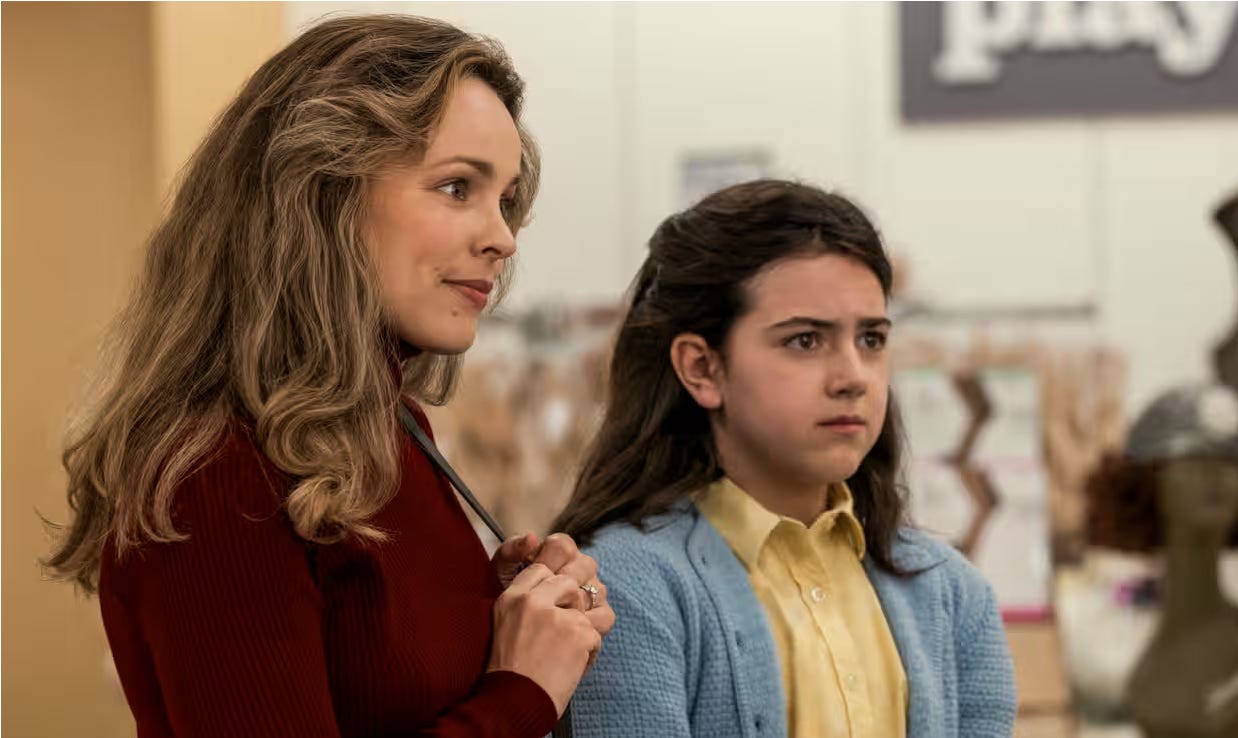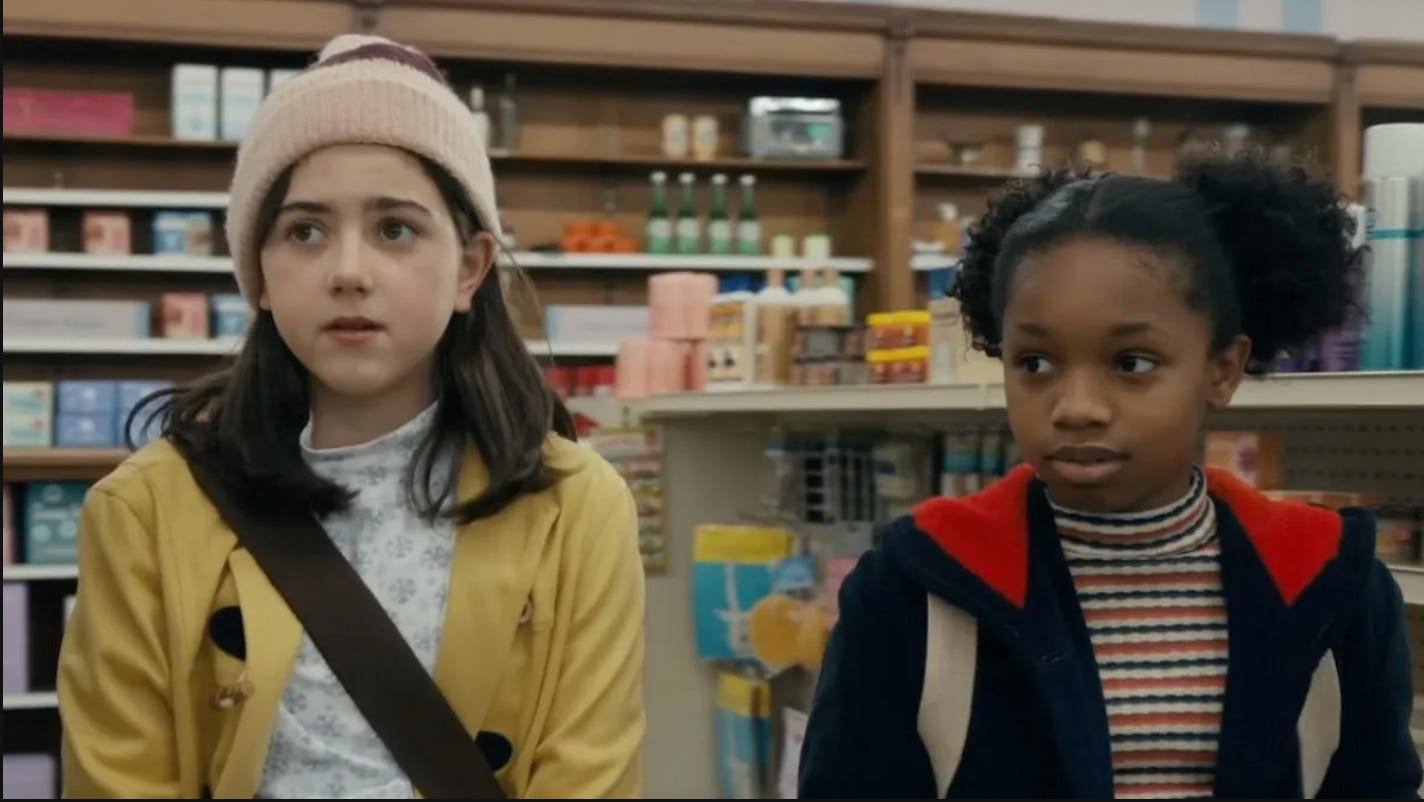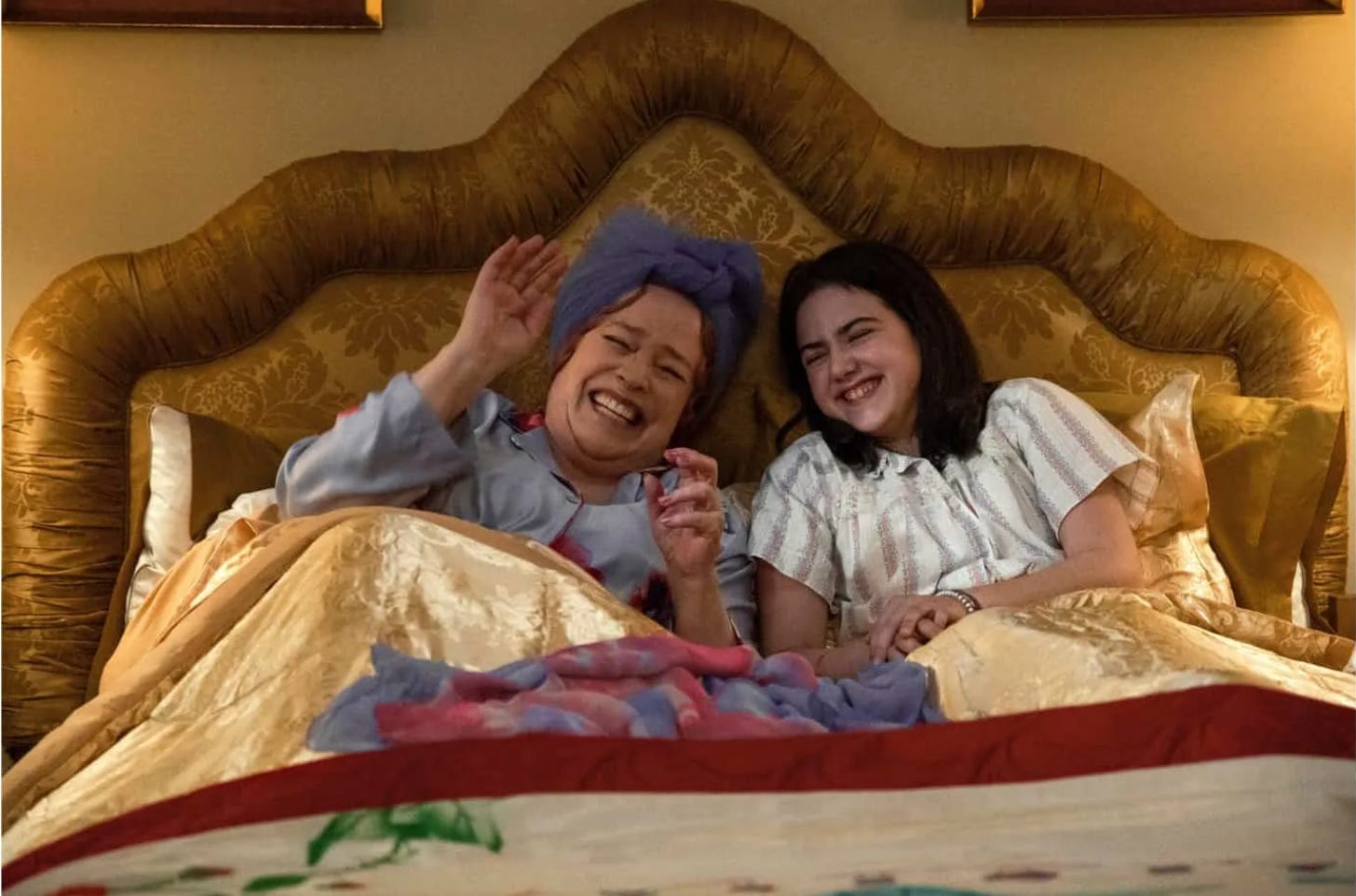Are You There God? It's me.
This Judy Blume adaptation of a beloved female coming-of-age classic has all the modern trappings to make it just right.
Director Kelly Fremon Craig, who at 42 is too young to have experienced puberty in 1970, nonetheless does an impressive job bringing fictional character 13-year-old Margaret Simon’s personal story from the 70s to the forefront, lending an accessibly bold voice to cringe-y topics like the sprint to get your first period, desire to increase your bust size, and crushes on boys whose first names’ rhyme with “goose.”
Are You There God? It’s Me, Margaret is available for rent on all major streamers for $6. I watched on Prime Video.

I didn’t do a lot of Judy Blume books growing up in the 80s and honestly, everyone tried to get me to read her. Somehow this particular book, Are You There God? It’s Me, Margaret, however was almost taboo in my household (could just be my recollection of events) though listening to the Audible version of it and now seeing the movie, I’m not exactly sure why. I don't even get why it would be a considered a banned book. Because it talks about menstruation? The weirdest thing about menstruation is the word itself, and that’s just unfortunate but also, funny.
Wouldn’t it be better if we all just acknowledged that puberty is awkward and messy and embarrassing? But also in equal parts, beautiful and amazing and something to behold with a measure of awe?
That’s what this movie serves to do and by gosh, it does.
Religious Motifs & Searching for Meaning
I’d been trying to drag my 11-year-old daughter to see this film since it debuted in the Spring and without much luck since it’s now nearing the end of Summer, but we got there. Finally she agreed to see the film with me as did my son. My husband roamed in and out of the living room during critical movie moments but got the gist.
Watching this movie with kids who are more-or-less the same age as Margaret and her classmates was a revelation. My kids couldn’t stop talking during the film and mostly it was about all the pitfalls of puberty and the things you learn about going through “the changes.” There was a lot of pausing the film to do it and my kids’ talkiness justice.

The dialogue happening in and around the TV had my brain firing on cylinders.
“I've been looking for you God. I looked in temple. I looked in church. And today, I looked for you when I wanted to confess. But you weren't there.”
There’s so much to unpack in this movie and so much of it felt on point for when I was 13, especially the religious parts.
When I was around this age, we were living in a suburb of Washington D.C. I didn’t like it much. Like the character of Margaret, we had moved from another place I liked better. Plus, it was in D.C. that my mom’s illness was diagnosed and she got even sicker. I remember vividly wanting to try out different religions as a way of figuring out this life and death stuff. I’m mostly Jewish, yes, but in my family tree, there’s also Catholicism and I was seeking reassurance and a level of spiritual connectedness and guidance. I remember having a few conversations with my mom about going to a church. This was nixed right away. So instead, I continued to pray at temple where a foreign language was sung that I didn’t understand and listened to without really feeling the draw of any of it. But then in equal parts, I felt guilty if I challenged it because of the proximity of the Holocaust to members of my family. If this is confusing for you to wrap your head around, imagine a 13-year-old sorting through this stuff. Nonetheless, the ritual of going to temple every Saturday provided stability by way of the routine as did Friday evenings when we all said short blessings before we ate yummy challah. Also, I had a mom to pray for, even with the religion doubts.
In the movie, Margaret’s dad (Benny Safdie) is Jewish and her mom is Christian, but her parents raise her without any religious identity and give her the choice when she’s older to pick the religion she wants. Religion is a difficult subject for Margaret as she approaches her teen years and reaches a more complex understanding of the world. She sees it as the primary source of conflict and estrangement within her family and she’s not wrong. Her mom’s parents disinherited their daughter when Barbara married Margaret’s dad, Herb. Margaret has never even met her grandparents. I guess my major beef with this is how will Margaret know what she identifies with if her parents don’t at least provide some basis or foundation in the way of education about their religions.
“Sometimes Grandma is almost as bad as everybody else. As long as she loves me and I love her, what difference does religion make?”
The movie remedies this as Margaret, with her insightful teacher’s gentle nudging, takes on a year-long research project in which she studies religions. She goes with her grandma Sylvia (Kathy Bates) to a Jewish temple, her friend Janie to a baptist church, and her classmate, Laura to a Catholic church confessional. Around the same time that she embarks on her research, Margaret starts talking to God and praying for things. She’s not even sure she believes in an Almighty Being but she wants to believe in something. This feels very on point for this time in a teen’s life.
In all of this exploration, Margaret doesn’t really connect with the religions she’s exposed to, and while this troubles her along the way, it leaves her ultimately more informed and more confident by the end of the year, especially when she sheds toxic friendships (Nancy Wheeler played by Elle Graham) and gravitates to healthier ones as represented by Janie (Amari Alexis Price), Laura (Isol Young) and her crush, Moose (Aidan Wojtak-Hissong).
A Period Piece
Everything this film does to promote period awareness and developmental changes is pitch perfect. Periods consume a tween’s mind and there’s a strange competitive pressure to finally get yours, especially if you happen to get yours after your friends got theirs. This is just how it all works.
So I particularly enjoyed all of the navel-gazing on this subject and the four friends just leaning into dissecting the wonders of it - the scariness of when it finally happens and the relative anti-climatic feel of it all. One of the core friend group members, Gretchen (Katherine Kupferer) is the first to get her period and the other girls are eager to hear how it unfolded. When she finally relays how normal it all was, “I was eating meatloaf and then I felt something and then I went to the bathroom and yelled to my mom to come” the girls are bewildered by the mundane ending.
On subjects of periods, there’s an entire industry dedicated to emergency period kits. I guess we’ve come a long way since 1970s menstrual belts.
The school administered menstruation health class video mandated for the 6th grade girls to watch was particularly hard to watch but I also found myself saying, “Oh yeah, I remember that.”
Your First Bra Experience
“Oh, you’re still flat.” Nancy laughed.
“Not exactly,” I said, pretending to be very cool. “I’m small boned, is all.”
“I’m growing already,” Nancy said, sticking her chest way out. “In a few years I’m going to look like one of those girls in Playboy.”
Well, I didn’t think so, but I didn’t say anything. My father gets Playboy and I’ve seen those girls in the middle. Nancy looks like she has a long way to go. Almost as far as me.
Nancy, Margaret’s first friend" in her NJ town, has bra wearing as a prerequisite rule for joining her secret after-school club so Margaret asks her mom to get her a bra. The scene in the department store, which btw, looked eerily similar to the department store bra section my own mother took me to for my first bra, is mortifying for Margaret. The saleswoman uses a tape measure and basically tells Margaret she really doesn’t need one yet which in turn makes her feel embarrassed. She leaves with a “Gro-Bra” which is what they would have called a training bra back in this Gen Xers day or I imagine the equivalent of a bralette today.
This video clip below has Nancy convincing the girls that they can increase their bust size by doing arm and chest exercises and chanting along with it. I think we’re still reciting this catchy chorus out loud in our house.
Finale
The closest I’ve seen to nearing the female tween to teen transition narrative in a heartwarming, real and up close way is The Babysitters Club on Netflix which was cancelled after season 2 and it’s a damn shame too. In one of the core episodes of the first season, the show’s main character, Kristy, gets her period and it’s during her mom’s wedding. Her mom isn’t around and this makes Kristy sad but all of her friends are there for her and one of them has even come prepared with a pad or tampon in her purse. They all give her a hug and supportive friend talk. When Kristy finally is able to say “bye” to her mom (Alicia Silverstone) later in the evening, she relays to her mom that she got her period. It’s such a beautiful moment between the two and the conversation had me taking notes.
The more we watch these types of stories onscreen, the more these important stories get made. It’s important for kids to watch movies that handle delicate and sensitive subjects of growing up with curiosity and laughter and not shame and self-hate. It’s also helpful for parents to see how these adult-to-kid interactions are modeled and to be able to laugh and cry alongside their kids.






I watched this film a couple months ago on vacation with a bunch of friends. We all rented a giant house on a river known for great kayaking, tubing, etc. We voted on what movie to rent late one night and, despite the male contingent voting against AYTGIMM, it won anyway. It was a lot better than I expected -- the casting was spot-on -- and felt like a throwback to a simpler time, before cynicism, social media and gun violence dominated the airspace. It was refreshing and laden with nostalgia. I never questioned being Jewish in my own young life. Then again, I didn’t question all that much in the world until I went away to college....see, nostalgia!
I reread the book before the movie came out and while I remembered much of it, I somehow forgot the whole religious part of it, which is honestly kind of the MAIN THING. I think I was just a Very Certain tween when I read it, so the idea that someone would have questions about faith or not have some kind of religious upbringing was unthinkable to me. But that landed so much more strongly with me as an adult who has a lot more questions than answers.
Beautiful movie. I hope it has a good life on streaming services.